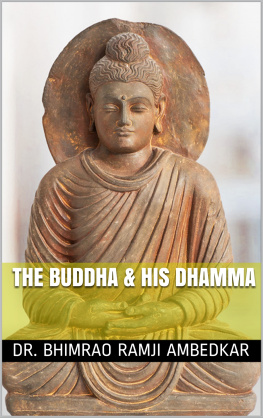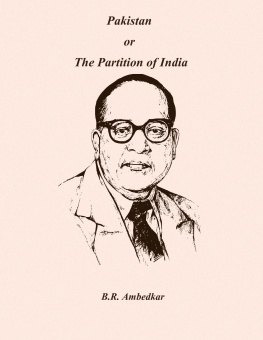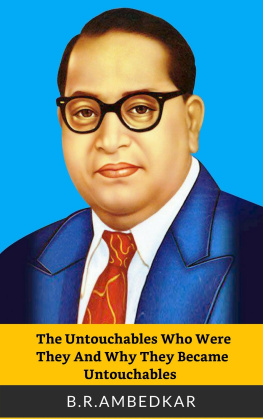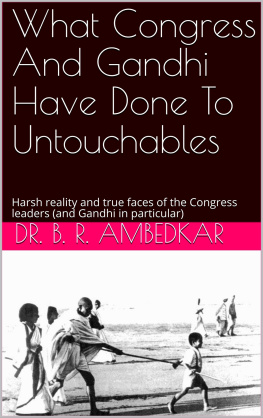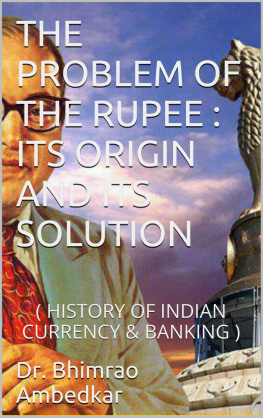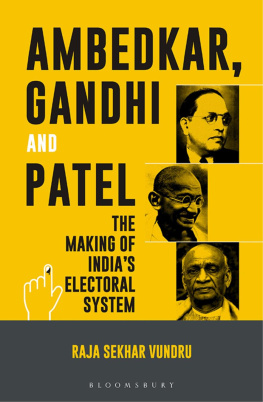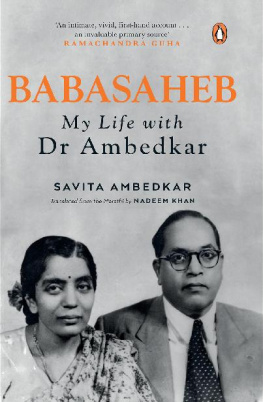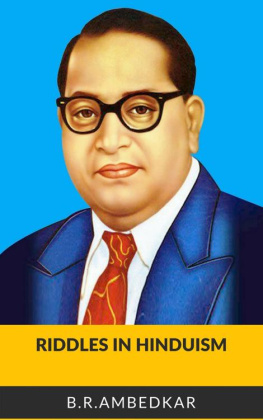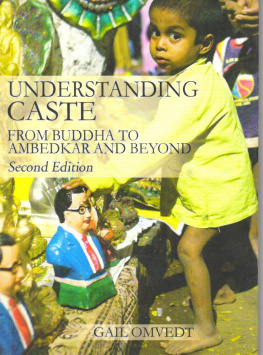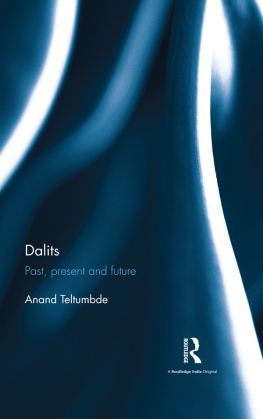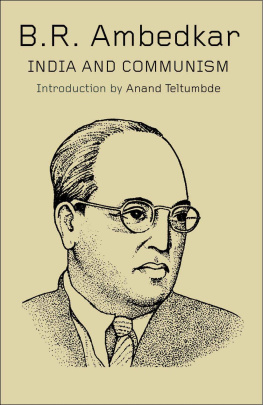AMBEDKAR
AMBEDKAR
An Overview
Published by
Rupa Publications India Pvt. Ltd 2018
7/16, Ansari Road, Daryaganj
New Delhi 110002
Copyright Rupa Publications India Pvt. Ltd 2018
The views and opinions expressed in this book are the authors own and the facts are as reported by him which have been verified to the extent possible, and the publishers are not in any way liable for the same.
All rights reserved.
No part of this publication may be reproduced, transmitted, or stored in a retrieval system, in any form or by any means, electronic, mechanical, photocopying, recording or otherwise, without the prior permission of the publisher.
ISBN: 978-81-291-4993-0
First impression 2018
10 9 8 7 6 5 4 3 2 1
This book is sold subject to the condition that it shall not, by way of trade or otherwise, be lent, resold, hired out, or otherwise circulated, without the publishers prior consent, in any form of binding or cover other than that in which it is published.
CONTENTS
INTRODUCTION
INEQUALITY CONTINUES TO perpetuate in India and the rest of the world. India has traversed through the ebbs and flow of a post-colonial era, but the kind of inequality is myriad. Much of it is bequeathed to us from timeless traditions and texts. An interaction with those traditions, texts and history could give us a clue as to how this land weathered the tension and skipped the European course.
Such an interaction is facilitated by the modern texts that intervene with the dominant tradition and history. The text that comes in the written form positions itself best to engage with much of entrenched ideas and belief system. The unique of the inequality has much to do with the course of Indias modernity. We appreciate modernity as that of a universalistic value system having its foundation on a sense of equality, we look up for a self-conscious modernist text that India can boast of.
Babasaheb Bhimrao Ambedkars writings come to us as the moral and ethical succor in Indias path to modernity. The moral question he raises is to privilege worth over birth. The ethical question is about the dignity of an individual as an equal citizen before a universal value system. At a more fundamental level, Bhimrao Ambedkars interventions lead us to a discursive field that links the mode of relations amongst us to the question of community and nation. The erudite and scholarly presentations need to be retrieved and reflected upon as willy-nilly India still grapples with the issue of equality, community and fraternity.
To be sure, till the mid-1990s and beyond, not many Central universities of this country while teaching about Indian society included Ambedkars works in its core syllabus. The question of caste and social change has been dealt with credible works backed by field studies. While any popular design of a sociology course would include backwardness and Untouchability as a problem in its last section, it is Indias tryst with parliamentary democracy, emergent political power and resistance that together form the rediscovery of Ambedkar as far as university syllabi are concerned. Not only that, essential writings of Ambedkar did slowly find its rightful place in all sociology courses, and his popular writings and speeches have caught the imagination of incisive followers of Indian society. It is interesting to note that Ambedkars works have been complied and organized across platforms as mainstream reading, and not just as text from the margin.
The wide range of themes and issues addressed by Ambedkar confront the dominant understanding of Indian society and its encumbrances. As a leading proponent of depressed classes, Ambedkar agitated academically and canvassed politically through his speeches, pamphlets, scholarly articles and drafting documents for a variety of councils and legislative bodiesa huge body of writings we can identify as couched in liberal modernist thoughts. Such an erudite and in-depth presentation clearly is not to be considered as just a challenge from the margin. It is an alternate mainstreama centre of reason and rationality. When interwoven together, they could propose a liberal democratic image of India as against the orthodox Indian society.
Such a critic of the orthodoxy could develop only at the cross-section of a personal biography and social history. The everyday life of an Untouchable, the mundane regularity of ignominy of early childhood of a Mahar child (Mahar is an Untouchable caste of erstwhile Bombay Presidency) shaped Ambedkars lived-in experience. As an entry point to an understanding of Bhimrao Ambedkars works, we may look up to his autobiographical anecdotes. We trace these in his collection Waiting for a Visa. Inter-subjective empathy can only help understand Untouchability in Hinduism to a certain extent and never fully. But a caustic indictment of Hinduism as a religion that rests on certain inegalitarian exclusionary principles can only be expected from Ambedkar, who had in fact encountered the humiliation.
An insiders viewpoint would definitely enrich any sociological appreciation of a vexed issue like that of Untouchability in India. It is all the more necessary now as much of formerly acclaimed sociological research on the caste system has been accused of skipping the role of a participant among the Untouchables in their field-work. Under a satirical title Waiting for a Visa, Ambedkar compiled some six anecdotes from his personal life that explored the particular aspects of Untouchability which dehumanizes an entire section of the Indian population. The narrative unfolds a bunch of varied experiences sharing a common threadthe practice of Untouchability. From the lived-in experiences of Ambedkar when he was a nine-year-old boy to his empathy for his kin facing the same conditions as him, on account of him being an Untouchable himself, this compilation may well serve as a diary of the condemned. Drawing partly upon experiences faced by him and partly upon the experiences of others, he graphically illustrates the actuality of the oppressive practices which make a member of the Depressed Classes an outsider to his own society, a bearer of filth whose touch is defilingone who could never touch or be touched by upper-caste Hindus.
Moving beyond a mere description of the ways Untouchability was practicised, Ambedkar empathically presents the experiential world of the Untouchables. The first few anecdotes are about the journey undertaken by him as a child with his elder brother and two cousins. It was a journey to catch up with his father who was posted in Koregaon (now Goregaon) during his summer vacation from Satara. It was a nightmarish experience as in an arduous train and subsequent bullock-cart ride, in which they could not even avail water to drink or washdue to which the four boys could not even eat the food that they were carrying with them. He experienced a harsh world around him that left an indelible impression on a tender mind. At that tender age itself Ambedkar began understanding that his position in society was challenged by his caste identity. While recollecting his past, he connects such experience with all the discrimination he faced at his school. He realized early on that the outside world was too heartless and cruel.
In another heart-rending episode, Ambedkar puts forward the point that a person who is an Untouchable to a Hindu is also treated as an Untouchable by a Parsi (or, for that matter by a person of any other religion) as well. It was his return from abroad to Baroda in 1918 that opened his eyes to the deeply entrenched practice of Untouchability in India. Availing a scholarship from the Maharaja of Baroda he travelled to Columbia University in the United States of America for higher studies. Those five years in the West completely wiped out of his mind the consciousness of being an Untouchable. Ignoring better opportunities in Indian Education Services, he felt committed to serve the Baroda State which had sponsored his studies abroad. He joined as a probationer in the Accountant Generals Office of the Maharaja of Baroda. Once in the Indian soil, again he faced the trials and tribulations of securing a lodging for himself on account of being an Untouchable. Finally, by impersonating as a Parsi he lodged himself in a Parsi inn. But on the eleventh day of his stay he had to face the wrath of a few Parsi youths and had to leave the inna wrath that was directed at his caste identity. Out on the street again, he failed to secure shelter even from his close friendsone a caste-Hindu and the other an Indian Christian. Ultimately, he quit Baroda and left for Bombay.


